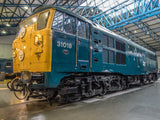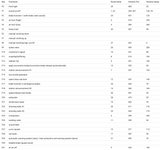After twenty pre-series locomotives of the six-axle Class 31 diesel locomotive, British Rail (BR) procured a further 243 units by 1962. The less reliable Mirrless diesel engine was replaced at an early stage by one from English Electric, which resulted in the 31/1 design, which was also equipped with an electropneumatic control system that had already proven its worth in other series. The 1100 kW diesel engine generates the energy for the four electric traction motors. The middle axles of the two bogies reduce the axle load of the locomotive and are not driven. The maximum speed of the locomotives, which were equipped with a steam boiler for passenger trains for many years, was 129 km/h.
Different starting processes can be selected with F1: 1x press button = warm start / press button 2x = false start / press button 3x = cold start
F2 slows down the locomotive slowly.
F5 enables the heavy load mode: The diesel notch is always one up compared with normal operation. If you want to jump two notches, simply set CV 104 to 150 (instead of 130).
F8 turns on the manual ntoching. Once F8 is on, you can use F7 to notch up and F6 to notch down. F8, F6, and F7 must be turned off to return to normal mode. If F8 is off and you press F7, the prime mover will run to full speed.
F14, F18 and CV 170 value 0 or 1, can switch between a "normal announcement" or an announcement "with gong".
F9 can increase the speed of the spirax valve by double-clicking it. The speed levels are slow, medium and fast.
17 will bring the locomotive to full stop.
F21 and CV 168 = value 0 or 1, can switch between a "normal" or a "squeaking" wiper.
F28 and CV 164 = Value 0, 1, 2 or 3, can switch between different rail joints (three coupler can be activated with CV 165 = value 1).
F29 and CV 169 = value 0 or 1, can switch between the "Automatic Warning System (AWS)" or the "Train Protection and Warning System (TPWS)".




